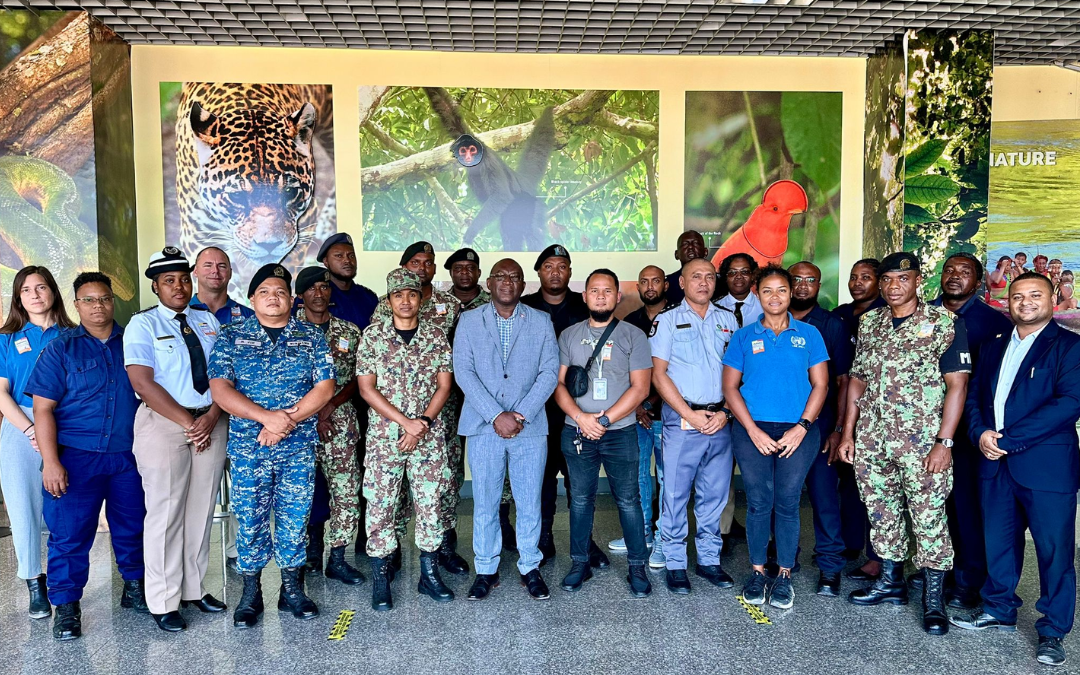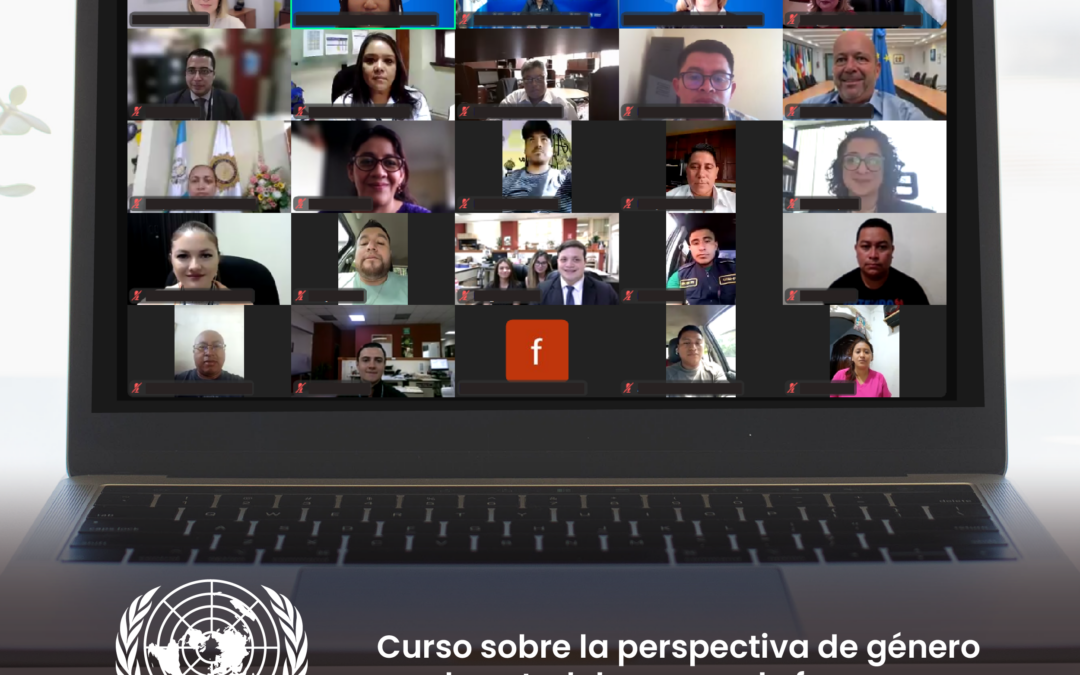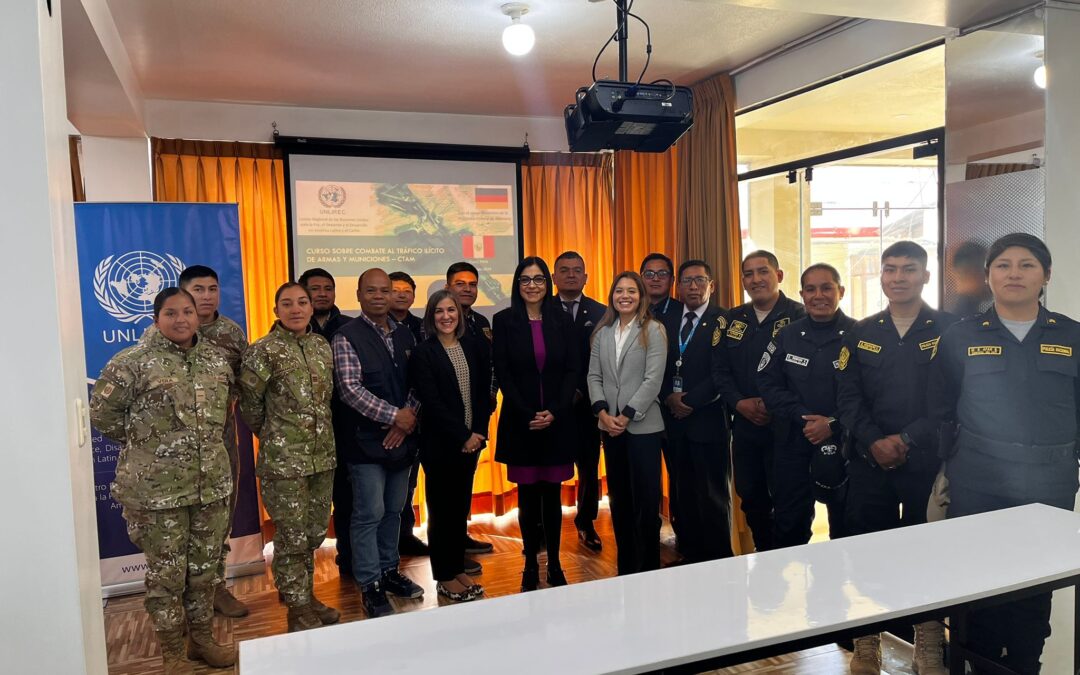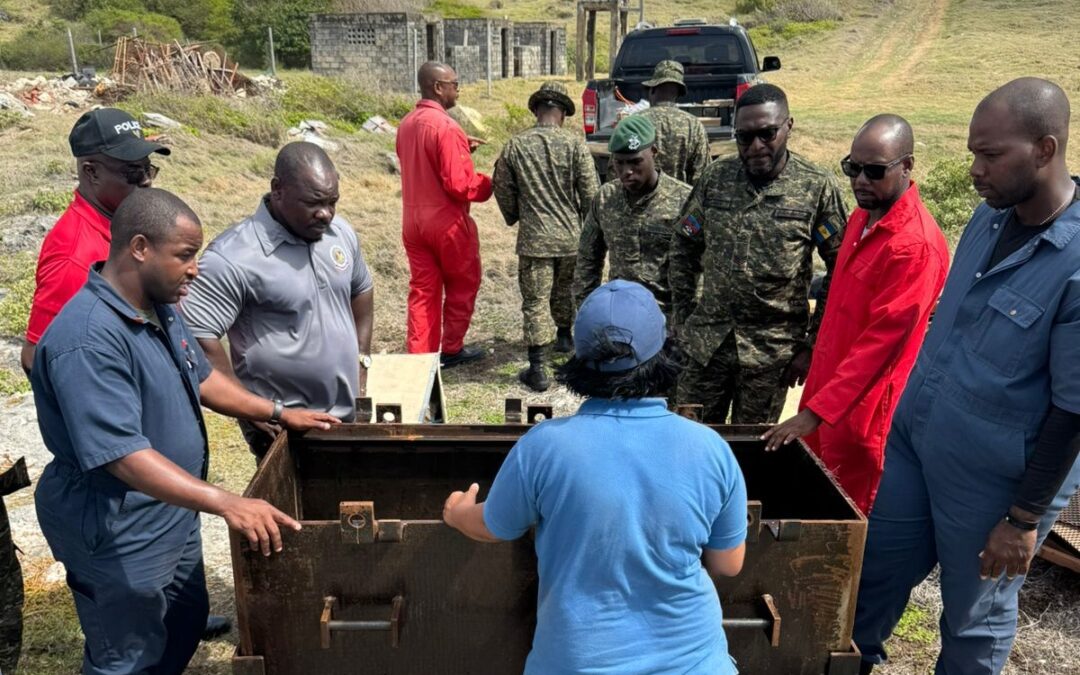
Sep 11, 2024 | Conventional Arms Programme
From 9-18 September, prosecutors from Honduras are participating in the Specialized Course for Prosecutors on the investigation of Firearms-related Crimes from a Gender Perspective (CEFAF). This course is organized by the United Nations Regional Center for Peace, Disarmament and Development in Latin America and the Caribbean (UNLIREC), in coordination with the “Orlan Arturo Chávez” Training School of the Honduran Prosecutor’s Office.
This course is conducted in a virtual format and aims to raise awareness among public prosecutors and support staff about the importance of incorporating the gender perspective into the design of legal strategies and the development of case theories in investigations of crimes against women involving the presence of firearms.
“The organization of this course was motivated by a deeply concerning issue: femicide, particularly the use of firearms in the commission of this grave crime. The extremely high rate of impunity for these offences is unacceptable. We must improve in this area. As prosecutors, t is in your hands to conduct thorough investigations that lead to arrests and subsequent convictions in the courts”, emphasized the representative of the UN Resident Coordinator’s Office in Honduras.
The Course for Prosecutors on the Investigation of Firearms-related Cases from a Gender Perspective (CEFAF) encourages exchange and participation. It aims to understand the experiences, good practices, and challenges faced by the Honduran Prosecutor’s Office in applying a gender perspective during investigations.
The CEFAF is aligned with the 2030 Agenda for Sustainable Development, particularly Goals 5 and 16. These goals aim to eliminate all forms of violence against all women and girls and to reduce illicit arms flows.
This activity is part of the SALIENT (Saving Lives Entity) in Honduras, implemented by UNLIREC (as the UN Office for Disarmament Affairs’ regional center) and the United Nations Development Program (UNDP).

Sep 4, 2024 | Conventional Arms Programme
From 4 to 25 September 2024, authorities from Surinameparticipated in a specialized training course on Interdicting Small Arms, Ammunition, Parts and Components (ISAAPC), organized by the United Nations Regional Centre for Peace, Disarmament and Development in Latin America and the Caribbean (UNLIREC).
Twenty-one officials, including five women, from various agencies — such as the Ministry of Defence, the Suriname Armed Forces, the Korps Militaire Politie, Airport Authorities and the Suriname Police Force— actively engaged in this hybrid course: This marks the first national ISAAPC training delivered in Suriname, aimed at enhancing the country’s capacity to detect trafficked weapons and ammunition.
The ISAAPC course combined virtual theoretical sessions with in-person practical presentations and exercises. Participants received hands-on training using an X-ray simulation programme, an interactive platform designed to teach users to identify concealment methods employed by traffickers in the region. This platform was developed by the Centre for Adaptive Security Research and Applications (CASRA).
Through this training, participants learned essential fundamental aspects of X-ray technology for detecting and identifying small arms, their parts and components, ammunition, and explosives placed or concealed in postal shipments, packages, parcels, and luggage at entry, exit, and transit points across the country.
The ISAAPC course UNLIREC’s technical assistance under the ’‘Combating Illicit firearms and Ammunition Trafficking in the Caribbean” project, funded by the United States. It aligns with the 2001 UN Programme of Action on small arms, the Arms Trade Treaty, and the 2030 Agenda for Sustainable Development, particularly target 16.4. This initiative also supports regional efforts to prevent illicit trafficking of firearms and ammunition, as outlined in the Caribbean Firearms Roadmap.

Aug 29, 2024 | Conventional Arms Programme
On 23 July, 25 July, and 14 August 2024, the United Nations Regional Centre for Peace, Disarmament and Development in Latin America and the Caribbean (UNLIREC), in collaboration with the Caribbean Community Implementation Agency for Crime and Security (CARICOM IMPACS) delivered a series of webinars centred on the monitoring and evaluation (M&E) component of the Caribbean Firearms Roadmap (CFRM).
The three webinars were conducted as part of a broader initiative to support States in their monitoring and evaluation efforts, titled “Roadmap to Reporting: A Sensitization and Training Series for Monitoring and Evaluation under the Caribbean Firearms Roadmap” ahead of the reporting deadline of 25 September 2024.
The webinars addressed three key topics, beginning with an introduction to M&E for the CFRM, followed by the data collection for the CFRM, and the use of data to advance the CFRM.
Presentations were delivered by UNLIREC, CARICOM IMPACS, and the United Nations Development Programme, Southern Eastern and Eastern Europe Clearinghouse for the Control of Small Arms and Light Weapons (UNDP SEESAC). Additionally, States were invited to share their experiences with the M&E processes of the Caribbean Firearms Roadmap during these sessions.
A total of fifty-nine persons participated in at least one of the webinars, including twenty-two women, representing nine States: Bahamas, Barbados, Belize, Dominican Republic, Haiti, Guyana, Jamaica, Saint Lucia, and Trinidad and Tobago.
The series of webinars was carried out in line with Goal 1 of the Caribbean Firearms Roadmap, in particular, Action 1.3.3, as well as Sustainable Development Goal 16, “Peace, justice, and strong institutions” (Target 16.4), and were made possible with funding from Canada.
UNLIREC, as the regional centre for the United Nations Office for Disarmament Affairs seeks to advance the cause of practical disarmament in Latin America and the Caribbean. This effort is part of its commitment to support Member States in implementing international disarmament and non-proliferation instruments, in particular the 2001 United Nations Programme of Action on Small Arms (UN PoA).

Aug 2, 2024 | Conventional Arms Programme
From 22 to24 July and 1 to2 August 2024, the United Nations Regional Centre for Peace, Disarmament and Development in Latin America and the Caribbean (UNLIREC), in coordination with the Ministry of Foreign Affairs and the Ministry of the Interior of Guatemala, conducted the virtual edition of the Course on Gender Perspective in Arms Control (GENCAF).
Approximately 30 officials from government institutions that comprise the National Violence Prevention Commission –participated, including the Ministry of the Interior, the Ministry of Foreign Affairs, the Technical Secretariat of the National Security Council, the National Police, the Strategic State Intelligence Secretariat;, the Ministry of Health and Social Assistance, and the Presidential Secretariat for Women (SEPREM).
The fact that most gun owners are men, along with the high levels of violence are associated with young men – both as perpetrators and victims – are not issues disconnected from gender roles. This is also true for the excessive and unregulated presence of firearms and the alarming rates of violence against women. According to data from ECLAC’s Gender Equality Observatory (consulted in October 2023), an average of twelve femicides were committed daily in the Latin American and Caribbean region during 2021.
In response to this problem, UNLIREC addresses key concepts related to gender and firearms through the GENCAF course. The course presents s the different global policy frameworks and emphasizes the importance of disaggregated statistical data as a crucial first step in diagnosing armed violence from a gender and intersectional perspective. Additionally, the course aims to promote inter-institutional cooperation among the participating national sectors.
The GENCAF course includes live sessions that allow participants to engage and share their experiences and reflections, as well as self-managed virtual sessions available on the Disarmament Education Dashboard.
It is worth noting that, to foster reflection on the context in Guatemala, the course included presentations national institutions, such as the Statistics Section of the National Police, the Ministry of the Interior and the civil society organization IEPADES (Instituto de Enseñanza para el Desarrollo Sostenible).
The Course on Gender Perspective in Arms Control (GENCAF) is part of the technical assistance provided by UNLIREC under the project Supporting the United Nations Programme of Action to Prevent, Combat and Eradicate the Illicit Trade in Small Arms and Light Weapons in All Its Aspects, which is funded by the European Union.

Jun 6, 2024 | Conventional Arms Programme
From June 3 to 6,2024, 22 officials participated in the Course on Combating Trafficking in Arms and Ammunition (CTAM), organized by the United Nations Regional Centre for Peace, Disarmament and Development in Latin America and the Caribbean (UNLIREC) in collaboration with the Ministry of Foreign Affairs of Peru.
Participants included personnel from the Puno region’s SUNAT-Customs, the Army, the Navy, the National Intelligence Directorate, the National Police of Peru, the National Superintendency for the Control of Security Services, Arms, Ammunition, and Explosives for Civilian Use (SUCAMEC), and local surveillance services (Serenazgo). They shared their experiences and challenges in addressing the issue of illicit arms trafficking.
During the opening of the event, the Coordinator of the Presidency of the National Commission against the Illicit Manufacturing and Trafficking of Firearms, Ammunition, Explosives and Other Related Materials (CONATIAF) expressed gratitude to UNLIREC and the Government of Germany for their support. She encouraged participants to share innovative initiatives that may arise from the course.
CTAM provided national authorities with valuable knowledge and tools, covering the global and regional landscape of arms trafficking, methods of illicit arms manufacturing, systems for controlling and documenting international transfers of firearms and ammunition, and tools and mechanisms for international cooperation against firearms trafficking.
This edition of CTAM featured presentations from the National Intelligence Directorate and the Directorate of Security and Defense of the Ministry of Foreign Affairs. They discussed the current trends and challenges related to illicit arms trafficking in Peru, along with measures and policies being implemented to combat this crime.
INTERPOL also contributed to the course bypresenting its Firearms Programme, which highlighted essential resources for the registration and tracing of weapons, as well as the outcomes of recent operations in Latin America. This collaborative environment fostered inter-institutional information exchange and promoted international cooperation.
This activity is part of the project “Support for the Implementation of Subregional, Regional, and Global Instruments and Frameworks Related to the Control and Management of Small Arms and Ammunition in in Latin America and the Caribbean”, funded by Germany.

May 27, 2024 | Conventional Arms Programme
On 27 May 2024, the United Nations Regional Centre for Peace, Disarmament and Development in Latin America and the Caribbean (UNLIREC), in collaboration with the Government of Barbados, began a Small Arms and Ammunition Destruction Exercise funded by the US Department of States Office for Weapons Removal and Abatement (WRA).
Improper and long-term storage of obsolete, seized and surplus firearms and ammunition can be a risk. Their destruction plays a crucial role in preventing diversion from the legal to the illicit sphere.
This UNLIREC-led project contributes to making the Caribbean region a safer one by supporting States in the effective implementation of the ‘Roadmap for Implementing the Caribbean Priority Actions on the Illicit Proliferation of Firearms and Ammunition across the Caribbean in a Sustainable Manner by 2030’ (Caribbean Firearms Roadmap).
During the 5-day exercise, the Barbados Police Service and the Barbados Defence Force destroyed a quantity of small arms and various calibers of ammunition. Additionally, during the period, four persons were trained in the destruction of weapons using hydraulic shears. Three independent government and civil society observers participated in the exercise. A Light Ammunition Burning Tank was also donated to the Government of Barbados by UNLIREC and will aid the future destruction of ammunition.
Since 2010, 23 Latin American and Caribbean States have destroyed more than 110,000 small arms and light weapons and more than 140 tonnes of ammunition with UNLIREC support.
UNLIREC, as the regional office of the UN Office for Disarmament, seeks to advance the cause of practical disarmament in Latin America and the Caribbean as part of its commitment to support Member States in their implementation of international disarmament and non-proliferation instruments, in particular, the 2001 UN Programme of Action on Small Arms.






